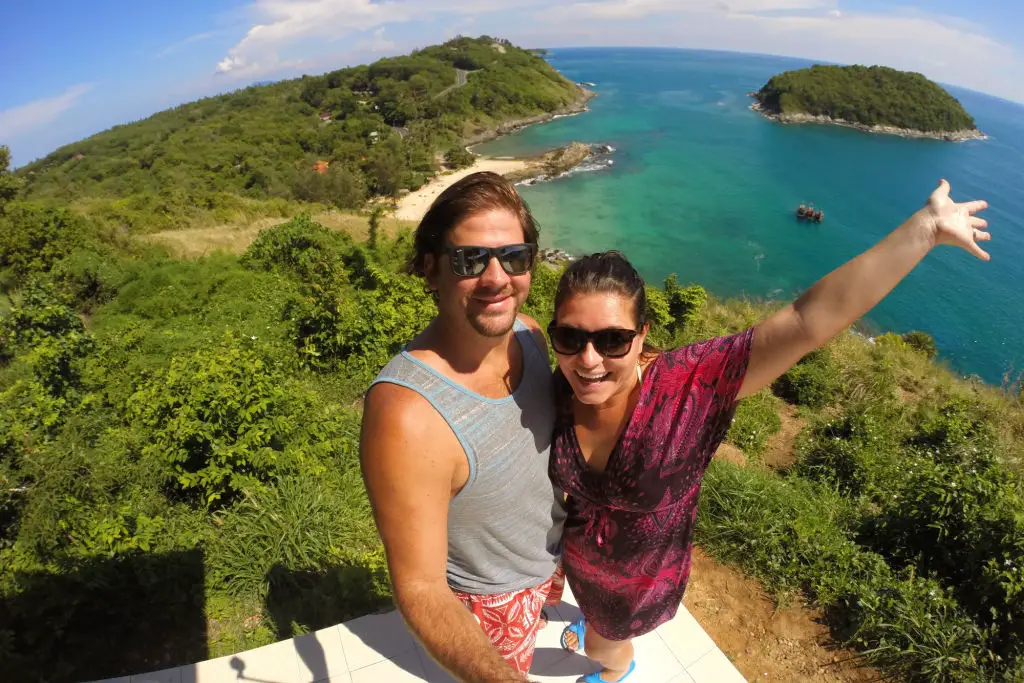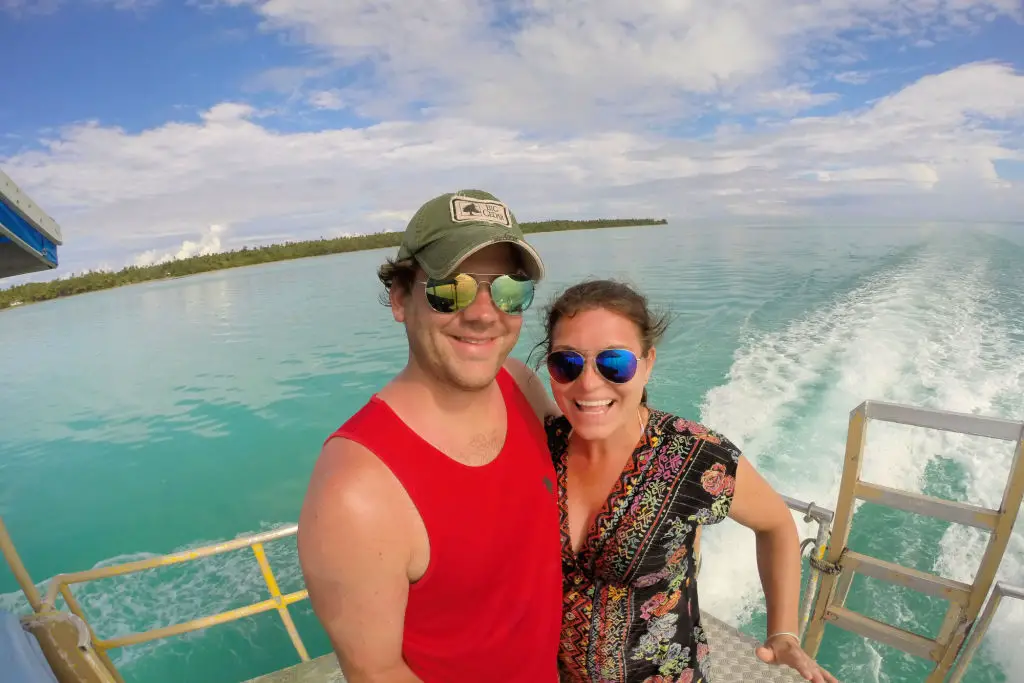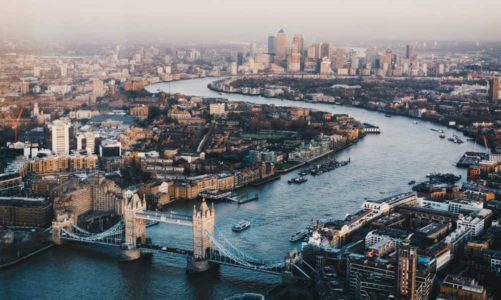If you’re like us, you’ve probably dreamed about what it would be like to move to a different country. While we haven’t permanently left the USA, we’ve had extended stints of up to 3.5 years abroad and other multi-year adventures. We’ve learned a lot through these experiences, and we’re excited to share our insights on the process and what you can expect if you’re considering moving to a different country.
In today’s interconnected world, more and more people are considering the prospect of moving to a different country. Whether it’s for career opportunities, a change of lifestyle, or simply the desire for adventure, relocating abroad can be an exciting and life-changing decision. With the cost of living in the USA skyrocketing and concerns about rising crime rates, many are looking to cheaper countries where their income stretches further and they can enjoy a safer environment.
Visit the Country Before Considering a Move
While it may sound like common sense, the most important thing you can do before moving to another country is to visit it first. Many people think they’re familiar with a country through world-famous travel books, videos, and social media, but unless you actually visit, you won’t truly know what to expect.

Here’s a reality check! Many travel bloggers (not us) portray destinations with a rosy filter that may not align with reality, so it’s essential to form your own impressions. From personal experience, we’ve visited places that were highly recommended but didn’t resonate with us, and vice versa.
A country can look very different on Instagram or in travel documentaries compared to the day-to-day reality of living there. That’s why it’s crucial to experience the place firsthand before making such a significant life change.
📖 Read Now: 👉 Expat Secrets: How To Pay Zero Taxes, Live Overseas & Make Giant Piles of Money
Prioritize Daily Life
When visiting a potential new home country, prioritize experiencing daily life over tourist attractions. For instance, in Bangkok, while Khao San Road and Sukhumvit Road offer wild nightlife and bustling markets, neighborhoods like Ari, Thonglor, and Ekkamai provide a more authentic feel with local markets, residential streets, and family-owned businesses.
It’s important to consider the neighborhood you want to live in, the vibe you’re looking for, whether you can afford it, and whether you’ll choose to reside in more expensive tourist areas or cheaper areas that are more relatable to the local community. This decision will significantly impact your daily life, budget, and overall experience in your new home.
Things To Do During Your First Visit
Consider first, staying in a hotel in a tourist location, then renting an apartment in a residential area. This way you’ll be able to interact with staff who can easily answer most of your questions to get your bearings and you will get a genuine feel for everyday life in your potential new home.
You’ll experience the neighborhood dynamics, and local amenities, and get a sense of what it’s like to live as a resident rather than a tourist. Pay attention to things like noise levels, the convenience of local shops, and the general atmosphere of the area.

For example, in many parts of Europe, we find it hard to get used to the constant noise from barking dogs and hammer drills used to drill into concrete. (Literally, as I’m typing this, a hammer drill just started. 🤦♂️) These sounds can be relentless and tough on the ears. If you want to live in these areas, you’ll need to adapt to the noise by leaving your apartment, sleeping with earplugs, or finding other coping strategies.
Everyday products or foods you rely on may not be available internationally. For example, just from our experience, and it may seem silly, but it’s hard to find quality underwear in certain countries—it’s like the material and sizes just don’t work for us.
Will you be able to adapt and find alternatives after moving to a different country? This adjustment might seem straightforward, but until you’re there in person, experiencing it firsthand, it can be challenging to navigate and determine if any personal necessities are missing.
Explore Neighborhoods
Take time to walk around different areas of the city or town. This will help you get a sense of where you might want to live. Pay attention to the vibe of each neighborhood, the types of housing available, and the local amenities. Look for things that are important to you, whether that’s green spaces, cafes, or community centers.
If you’re hesitant to explore on your own, book a walking or informative tour to gain some insight into the area. Do this early in your trip to get your bearings. We also recommend renting a car for at least one day to explore beyond the area you’re considering moving to. You might discover beautiful places within a day’s drive that you could visit regularly on day trips.
Use Public Transportation
Navigate the local transit system as residents do. This will help you understand how you’d get around in your day-to-day life. Take buses, trains, or subways to different parts of the city. Notice the frequency, reliability, and cleanliness of the services. This experience will also give you insights into commute times and the overall efficiency of the public transportation system.
Shop at Local Markets and Supermarkets
Visit local grocery stores and markets to get a feel for food availability and costs. This will give you an idea of the local diet, the variety of products available, and how much your regular shopping might cost. Pay attention to the quality of fresh produce, the availability of any specific dietary items you need, and how prices compare to what you’re used to.
Additionally, think about the neighborhood where you plan to live. How will you get from the grocery store to your apartment—will you have a cheap rental car, or will you walk or use public transportation? Transitioning from easily loading groceries into a car and driving them home to carrying everything on foot can be a massive change. It may alter your entire diet, but at least you’ll likely get some extra free exercise!
Try the Healthcare System
To ensure you’re covered in case you catch a cold or another illness while traveling, it’s always important to purchase inexpensive and reliable travel health insurance before your trip. While it’s never fun to get sick, this will allow you to experience the local healthcare firsthand.

Furthermore, this will give you an idea of the quality of care, wait times, cost, and general processes. Pay attention to factors like the availability of English-speaking staff (if relevant), the cleanliness of facilities, and how appointments are scheduled and managed. Don’t be scared to walk into a hospital and check out how it looks. In fact, we encourage it.
Meet with Expats
Connect with others who have already made the move. They can provide valuable insights into the challenges and rewards of living in your potential new home. Check out Facebook expat groups as they have some of the most reliable up-to-date information.
Ask about their experiences with finding housing, navigating bureaucracy, and integrating into the local community. Their firsthand experiences can help you prepare for your move and avoid common pitfalls.
Visit Schools or Workplaces
If you have children or are planning to work, visit relevant schools or workplaces. This will give you a concrete idea of the educational or professional environment you or your family might be entering. For schools, consider factors like curriculum, facilities, and extracurricular activities. For workplaces, pay attention to the work culture, commute, and general atmosphere.
Attend Local Events
Go to community gatherings, markets, or festivals to get a sense of the local culture. This will give you insight into the social life of the area and help you understand how you might fit in. It’s also a great way to meet locals and get a feel for the community spirit. Pay attention to the types of events available and how they align with your interests.
Learn Some of the Language
Take a short language course using Rosetta Stone, or practice with locals to gauge the language barrier. Even if you’re moving to a country where your native language is widely spoken, learning some of the local language can greatly enhance your experience.
It shows respect for the local culture and can help you integrate more easily. Pay attention to how difficult you find the language and how much progress you can make in a short time.
Visit During Different Seasons
If possible, make multiple trips to experience the climate year-round. This is particularly important if you’re moving to a place with distinct seasons. What seems like perfect weather during a summer visit might be very different in the depths of winter. Consider how the changing seasons might affect your daily life, from commuting to leisure activities.
What Does it Mean to “Live Like a Local?”

Living like a local goes beyond just staying in a non-tourist area. It means putting yourself in the daily rhythms and routines of the place you’re considering calling home. This could involve:
- Shopping at Neighborhood Stores: Instead of sticking to familiar international brands, explore local markets and shops. You’ll discover unique products and get a better feel for the local economy.
- Eating at Local Places: Seek out restaurants, cafes, and street food vendors popular with locals. This not only saves money but also provides an authentic taste of the local cuisine.
- Observing Local Customs and Etiquette: Pay attention to how people interact, dress, and conduct themselves in public. Understanding and respecting these norms can help you integrate more smoothly into the community.
- Engaging in Small Talk: Building relationships with locals can provide valuable insights and make your new environment feel more like home. Simple conversations can lead to friendships and a deeper understanding of the culture.
- Experiencing Rush Hour: Travel during peak times to get a realistic sense of daily life. This will help you understand the pace and stress levels associated with commuting in your potential new home.
- Dealing with Local Bureaucracy: Tasks like setting up a bank account, getting a local SIM card, or registering with local authorities can be challenging but are essential parts of living abroad. These experiences can teach you about the efficiency and transparency of local systems.
- Participating in Community Activities: Joining clubs, attending community events, or participating in local sports can help you meet people and feel more connected to your new home.
By doing these things, you’ll get a much clearer picture of what your life might look like if you decide to move. You’ll encounter the challenges as well as the pleasures of daily life in your potential new home.
Why Move Abroad?

The decision to move to another country is often driven by a combination of factors, each unique to an individual’s circumstances and aspirations. Understanding these motivations can help potential expats clarify their reasons for considering such a significant life change.
Here are some common reasons people choose to relocate internationally:
Lower Cost of Living
For many of us, moving to a country with a lower cost of living can provide financial relief and increased purchasing power. This is particularly attractive for retirees or remote workers who can maintain their income while significantly reducing their expenses. Countries in Southeast Asia or parts of Eastern Europe, for example, can offer a comfortable lifestyle at a fraction of the cost of living in more expensive Western nations.
Better Quality of Life
Some of us move abroad in search of a higher quality of life. This could mean access to better healthcare systems, improved work-life balance, or a more desirable social environment. Countries with strong social support systems, lower crime rates, or better environmental conditions often attract those looking to improve their overall lifestyle.
Cultural Immersion
The desire to experience a new culture firsthand drives many of us to relocate abroad. Living in a foreign country allows for deep cultural immersion, providing opportunities to learn a new language, understand different perspectives, and broaden one’s worldview. This cultural exchange can be both personally enriching and professionally beneficial in an increasingly globalized world.
Personal Growth
Moving to a new country often pushes us out of our comfort zones, fostering personal growth and independence. Navigating unfamiliar environments, overcoming language barriers, and adapting to new social norms can build resilience, improve problem-solving skills, and increase self-confidence. Many find this challenge exhilarating and view it as an opportunity for self-discovery and personal development.
Career Advancement
Many professionals seek opportunities abroad to accelerate their career growth. International experience can be highly valued by employers, and some industries may offer more advanced positions or higher salaries in certain countries. Working abroad can also provide exposure to new technologies, methodologies, and global business practices that can significantly enhance one’s skill set and marketability.
Retirement in a More Favorable Climate
Retirees often seek out countries with milder climates to enjoy their golden years. Warmer weather can be beneficial for health conditions and allows for a more active outdoor lifestyle year-round. Countries with tropical or Mediterranean climates are particularly popular among retirees from colder regions.
Educational Opportunities
Many individuals, especially students and young professionals, move abroad to access educational opportunities not available in their home countries. This could involve attending prestigious universities, participating in specialized research programs, or gaining practical experience in fields that are more advanced in certain countries. The exposure to different educational systems and diverse student bodies can provide a unique and valuable learning experience.
5 Popular Destinations – Moving to Another Country

While certainly not some of the cheapest places to relocate to, below are a few of the most popular places for moving to a different country, each offering unique attractions and benefits:
1. Canada
Known for its high quality of life and welcoming attitude towards immigrants, Canada consistently ranks as a top destination for moving to a different country. The country offers excellent healthcare, a strong education system, and beautiful natural landscapes. Its multicultural cities, like Toronto and Vancouver, provide diverse communities where newcomers can often find a sense of belonging. Canada’s points-based immigration system also makes it relatively accessible for skilled workers.
2. Australia
Australia offers a laid-back lifestyle and a robust economy that attracts many expats. Its major cities like Sydney and Melbourne are known for their high standard of living, while the country’s vast natural beauty provides ample opportunities for outdoor activities. The warm climate, beautiful beaches, and unique wildlife are additional draws. Australia’s skilled migration program also makes it an attractive option for professionals in various fields.
3. Germany
Germany boasts a strong job market and a central European location, making it a hub for career-oriented expats. The country is known for its efficiency, excellent public transportation, and strong social support systems. Cities like Berlin have become hotspots for startups and creative industries, while traditional powerhouses like Munich and Frankfurt offer opportunities in fields such as engineering and finance. Germany’s rich history and cultural scene also add to its appeal.
4. Spain
Spain attracts many with its warm climate and rich culture. The country’s relaxed lifestyle, delicious cuisine, and lively social scene are major draws for expats. Coastal areas are particularly popular among retirees and digital nomads.
While the job market can be competitive, Spain offers a high quality of life even on a modest income. The country’s healthcare system is also highly regarded, and its central location in Europe makes it easy to travel to other countries.
5. New Zealand
Praised for its natural beauty and work-life balance, New Zealand has become increasingly popular for moving to a different country. The country offers a high quality of life, with clean air, low population density, and stunning landscapes.
New Zealand’s economy is stable, and its government is known for being progressive and well-managed. The country’s emphasis on outdoor activities and work-life balance is particularly attractive to those seeking a change from high-pressure work environments.
First Things First – Plan the Transition
Remember, moving to a different country is a significant decision that will impact every aspect of your life. While it can be tempting to rush into an exciting new adventure, taking the time to visit and truly experience your potential new home can save you from potential disappointment and ensure that you’re making the right choice for your future. Embrace the journey, do your homework, and you’ll be better prepared to make your overseas move a successful and fulfilling one.
We Need Your Help
Did you find this article helpful? If so, bookmark it and when you’re planning your next vacation, click on any of the links below before finalizing reservations. You’ll get the best price, we’ll earn a small commission, and you’ll help support future articles.
Thank you!
BEST TRAVEL SEARCH ENGINES
🏘️ Book Accommodation
We use Tripadvisor to compare prices and reviews in advance and check availability
✈️ Book Your Flight
To find the cheapest flight options, use Skyscanner to find the most suitable choice for you
🚗 Reserve Rental Car
Use Discover Cars to compare prices and view the largest selection of vehicles



